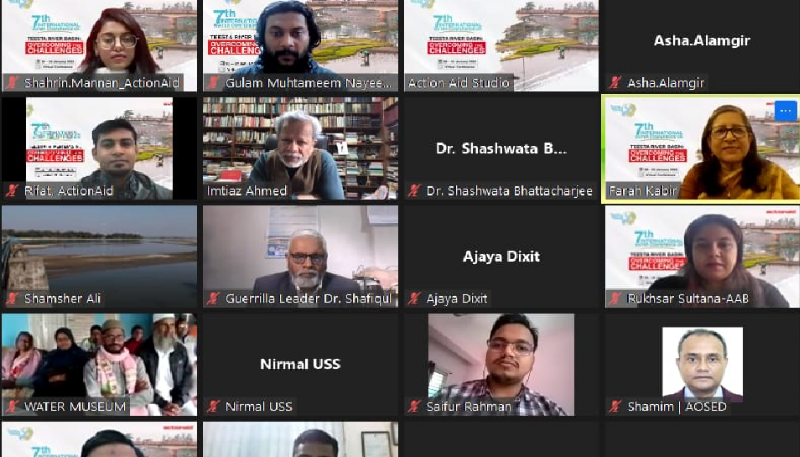Staff Correspondent
Published:2022-01-23 10:27:06 BdST
Scope still there for cooperation on Teesta water allocation: Prof Imtiaz
International affairs expert Dr Imtiaz Ahmed has said there is still room for cooperation on Teesta River water allocation and it cannot result in a zero-sum game.
"The solution should come keeping in mind the human and nature-based perspective," said the professor at the Department of International Relations, Dhaka University on Saturday.
He said this while delivering his speech on the last day of the three-day virtual 7th International Water Conference titled ‘Teesta River Basin: Overcoming the Challenges’ organised by ActionAid Bangladesh.
Dr Imtiaz said it is time to come out from an engineering perspective in river water governance.
Farah Kabir, Country Director of ActionAid Bangladesh said people live with rivers, but they were not included in the river-related discourse.
The idea for establishing a Water Museum in Kalapara, Patuakhali came from the inclusion of community people in the discourse and the first-ever community-based Water Museum in South Asia was established in 2014 by ActionAid Bangladesh, she said.
The Water Museum now has become a hub for idea generation, the voice of river-based grassroots people, educational platform, and networking with global water museums, said Farah Kabir.
Dr Eriberto Eulisse, Executive Director of the Global Network of Water Museums, said the Teesta River is a symbol of changes like other rivers. "Cooperation and good practices are needed to resolve any kind of water-related resources dispute.”
While developing any water museum, he said, they should not only keep in mind the infrastructural development but also the cultural landscape.
Former Foreign Secretary Shahidul Haque said in the ‘negotiative’ world, they can find a better way of collaboration regarding the Teesta water allocation.
“There’s need to have more interactions between the international stakeholders, people and the political leaders. Narratives also should be different considering climate change,” he added.
Shahidul Haque laid emphasis on a change in mindset and framing of policymakers from a broader people-centric frame rather than the government-centric frame.
Rahima Sultana Kajal, Executive Director, Association of Voluntary Actions for Society (AVAS), and Member of General Assembly ActionAid International Bangladesh Society in her presentation showed how Water Museum in Kalapura, Patuakhali, established by ActionAid Bangladeshis working as a medium of upholding rights of the marginal people.
“River-centric civilisation is being jeopardised as a result of obstructing the flow of rivers. Due to the so-called development, river water is not being distributed evenly which has resulted in a shortage of usable water. The existing laws on river water usage are not being properly enforced,” said Rahima Sultana Kajal.
Dr Shashwata Bhattacharjee, Head, Bangla Department Kaunia College, said if the river dies, the community people's lives centring the river also die. "If that community 's life is detached from the river-centred livelihood, then the thousand-year-old cherished culture is also ruined."
Ajaya Dixit, Advisor, ISET-Nepal; Dr Sara Ahmed, Adjunct Professor, Centre for Water Research, IISER-Pune (Indian Institute for Science Education and Research), Founder-Director, Living Waters Museum, Shamim Arfeen, Executive Director, AOSED also discussed in the last day of the water conference.
Unauthorized use or reproduction of The Finance Today content for commercial purposes is strictly prohibited.


